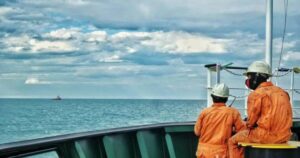Oluyinka Onigbinde
The Nigerian Liquefied Natural Gas, Ship Management Limited (NMSL) has decried the high rate at which the country is losing seafarers to other nations, owing to regulatory deduction of Company Income Tax (CIT) and pensions from seafarers wages.

The NMSL speaking at a training organized by the Shipping Correspondents Association of Nigeria (SCAN) with the theme, ‘Nigerian Liquefied Natural Gas (NLNG) Vessels Movement and Challenges.’ disclosed that Nigeria is the only country where income tax is deducted from seafarers wages globally,
Speaking during the panel discussion, the Fleet Manager, NLNG Ship Management Limited (NSML), Captain Hambali Yusuf, noted that the deduction, which was estimated at 30 per cent of the employee’s salary for both (taxes and pension), means that the seafarers earn less.
He explained that by the deduction, an employer in the shipping business needed to raise his workers’ wages, or he would lose them to foreign organisations.
According to him: “imagine you are a seafarer. Company ‘A’ is going to pay you $100 without tax deduction, while company ‘B’ will pay you $100 but will deduct taxes, which are from 18-24 per cent of the $100, as well as pension. Who would you work for? These are some of the challenges we face in the sector. By taking taxes, you are deducting 30 per cent of the salary. For you to achieve that standard payment, you will need to increase the salary. It makes it very difficult.
“What I said is that it is only Nigerian seafarers that pay taxes in the whole world. In India, they have conditions. In India, if you are not in the country for seven months, you won’t pay any tax. But in Nigeria if you are not around for a whole year, you are still going to pay tax, and you know the tax is graded depending on your grade.”
Also speaking, the Human Resources Manager, NSML, Mr Henry Agbodjan, lamented that Nigerians were being snatched up by foreign firms immediately after they had been trained to certain levels.
Agbodjan said: “Nigerian seafarers are beginning to get accepted by foreign organisations. We train these officers, they grow up to a certain level, and then they start getting attention from abroad. The United Kingdom company is taking them, the Norwegian company is taking them and we are here, trying to develop the Nigerian economy to have senior seafarers at the top. As soon as they get there, they can even get another $1000 a month job, which doesn’t require any tax or pension deduction. So they are off.”
He also mentioned that International Oil Companies (IOCs) were after advanced professionals in the NLNG organisation, saying since the oil and gas business is considered more profitable than maritime, Nigeria would not but be losing hands to those firms, a situation he said was “giving one sleepless nights.”
Speaking earlier, the Managing Director of the NSML, Abdulkadir Ahmed, had in his opening address listed the paucity of qualified and competent officers globally as part of the challenges of the shipping industry.
Ahmed lamented a global shortage of skilled officers in the maritime industry.
“Industry sources point to an increasing demand for qualified seafarers, particularly the officers, and this situation is expected to persist into the future. Diminishing attractiveness of a career at sea, coupled with rising man-berth ratios and a continued fleet growth, is likely to result in the highest shortfall of officers in the coming years,” he said.
Read Also: Senate Passes Federal University Of Transportation Bill
He advocated the need for the Gulf of Guinea to be free of pirates this year, noting that the International Maritime Bureau (IMB) highlighted the Gulf of Guinea (GoG) as a hotspot for piracy attacks, with 43 per cent of all regional attacks in 2021 happening there.
The NSML chief executive reiterated his commitment to supporting the growth and development of the Nigerian maritime industry through the maritime services.
Earlier, Mr Eugene Agha, President of SCAN, said that gas is not only the future of global energy exploration and usage, but also Nigeria’s huge source of revenue and employment.
Agha noted that the changing trends in the global energy sector demanded a corresponding improvement and updating of the knowledge and skills of the media practitioners.
“This will help them to continually avail stakeholders of the opportunities and risks inherent in this sector, which can attract more enabling legislation to reposition the sector.
“It will also tackle challenges and pull healthier competition and more gains,” he said.
Kindly like us on Facebook















